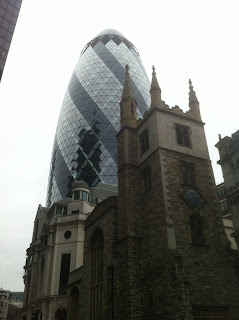War versus Shopping
I do not often find myself in agreement with either bankers
or leading religious figures. How
curious, then, to find myself slack-jawed last Friday when, in the middle of
his contribution to Parliament’s debate on the latest war in Iraq, the
Archbishop of Canterbury and ex-banker Justin Welby said:
“We must face the fact that for some young Muslims the attractions of
jihadism outweigh the materialism of a consumer society.”
My goodness. The
Archbishop is suggesting that jihadism is in some sense the same kind of thing
as ‘consumer society’. What kind of
thing is that? Welby says:
“If we struggle against a call to eternal values, however twisted and
perverted they may be, without a better story, we will fail in the long term.”
And there we are. Jihadism
and ‘consumer society’ are stories; so is Christianity. This latter story, needless to say, is the
one the Archbishop wishes to see promoted as the ‘better story’ capable of
defeating jihadism – and, presumably, consumer society.
By 'story' he is not, of course, referring to a mere fairy
tale, or the narrative arc that courses through your favourite soap opera, or the anecdote you told your friend the other day about the humorous event at the
weekend. No. He is talking about a grand story, an
all-encompassing narrative, an explanatory myth: perhaps even a cosmology, or a paradigm.
These are things of which I have written before: here, for example, I talked about ‘the
language of sustainability’ and argued that the ‘story’ of capitalism (or
‘consumer society’) comprises an interlocking set of concepts that, on one
hand, holds itself in place through the interlocking process and, on the other,
resists and rejects concepts that are inconsistent with the prevailing
language. (There were/are some nice pictures , too.)
And here, and more recently, I tried to argue that, as they grow and develop, people
encounter stories about the world around them, stories between which they have
to choose, given the life they find themselves living, and which act as a frame within which they make the various decisions that they do.
This builds towards and around a line of thought that has been
gathering momentum in the environmental/sustainability space in recent years (see e.g. here or here), namely that methods such as telling people that this behaviour is bad, or
encouraging them to buy that ‘sustainable’ product, or warning them just how
terrible things will be once climate change is in full effect – these methods
are doomed to failure precisely because they do not provide a compelling and inclusive story. The challenge facing
those of us who wish to persuade millions of our fellow citizens to adopt
sustainable lifestyles as part of a sustainable economy and a sustainable
society is to have a story about the future that is manifestly better than the
story of ‘consumer society’.
Some people, it seems, think that jihadism is such a
story. Justin Welby, presumably,
believes that “the message of Jesus
Christ and the justice, healing and redemption that he offers” is such a
story. The competition, remember, is something of the form: "Shiny thing make it all better."
It strikes me that these are not especially sophisticated or impressive stories. Can it really be that hard to come up with something better?
It strikes me that these are not especially sophisticated or impressive stories. Can it really be that hard to come up with something better?
Perhaps, in fact, it’s not just the story – it’s also the means
of telling. Jihadism speaks with brutal
violence and mysterious savagery. The
Church has at its disposal innumerable buildings, preachers and rituals. Consumerism has shops and advertising and an
unending stream of innovation-fuelled products called 'new'. Feel the glamour, the commitment - the power!
A secular twenty first century myth is required; and it
needs not just to be imagined and written, but told and told again in the face
of powerful resistance. It would be nice
if ‘science’ could step up to the plate – the rise and rise of popular science,
of Jared Diamond and Steven Pinker and Brian Cox, is surely a step in the right
direction – but I’m not sure it’s enough.
The grand myths of science (see E O Wilson) are wonderful in their own right, but there is
some sort of gap between the cosmic grandeur of the universe or the stupefying
outcomes of natural selection and the ordinary day-to-day experience of ordinary
people. For a myth – a story – to work
(to be an organising principle for how to live a life) is has to join things
up.
Aldous Huxley - a story-teller of some skill - tried harder than most to join things up, attempting to 'build bridges' (in the words of his 1959 lectures) between the domains of science, art and spirituality, he having concluded that humanity was otherwise pretty much doomed. He failed, by his own measure, and half a century later we still seem in need of the 'providential genius' he thought would be necessary.
Aldous Huxley - a story-teller of some skill - tried harder than most to join things up, attempting to 'build bridges' (in the words of his 1959 lectures) between the domains of science, art and spirituality, he having concluded that humanity was otherwise pretty much doomed. He failed, by his own measure, and half a century later we still seem in need of the 'providential genius' he thought would be necessary.
Still, I'd rather keep looking for a new Shakespeare, and preparing to lend a shoulder to his or her wheel, than prepare for a future of either war or shopping.
[If there's a photo down here it was added
August 2017 as part of blog refresh. Photo is either mine or is linked to
where I found it. Make of either what you will.]



Comments